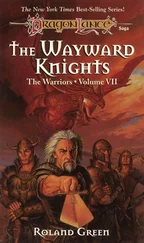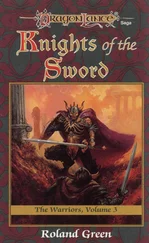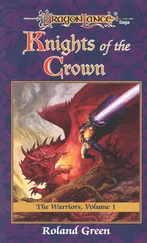Roland Green - Knights of the Rose
Здесь есть возможность читать онлайн «Roland Green - Knights of the Rose» весь текст электронной книги совершенно бесплатно (целиком полную версию без сокращений). В некоторых случаях можно слушать аудио, скачать через торрент в формате fb2 и присутствует краткое содержание. Год выпуска: 2012, ISBN: 2012, Издательство: Wizards of the Coast Publishing, Жанр: Фэнтези, на английском языке. Описание произведения, (предисловие) а так же отзывы посетителей доступны на портале библиотеки ЛибКат.
- Название:Knights of the Rose
- Автор:
- Издательство:Wizards of the Coast Publishing
- Жанр:
- Год:2012
- ISBN:978-0-7869-6340-9
- Рейтинг книги:3 / 5. Голосов: 1
-
Избранное:Добавить в избранное
- Отзывы:
-
Ваша оценка:
- 60
- 1
- 2
- 3
- 4
- 5
Knights of the Rose: краткое содержание, описание и аннотация
Предлагаем к чтению аннотацию, описание, краткое содержание или предисловие (зависит от того, что написал сам автор книги «Knights of the Rose»). Если вы не нашли необходимую информацию о книге — напишите в комментариях, мы постараемся отыскать её.
Knights of the Rose — читать онлайн бесплатно полную книгу (весь текст) целиком
Ниже представлен текст книги, разбитый по страницам. Система сохранения места последней прочитанной страницы, позволяет с удобством читать онлайн бесплатно книгу «Knights of the Rose», без необходимости каждый раз заново искать на чём Вы остановились. Поставьте закладку, и сможете в любой момент перейти на страницу, на которой закончили чтение.
Интервал:
Закладка:
Roland Green
Knights of the Rose
Prologue
The onshore breeze made the breakers foam high over the bar, but the slim-hulled green ship with the three red sails easily rode over them. For one moment, her prow was pointed at the blue sky; for the next, her rudder was clear of the water.
Momentum, and skilled hands on the sheets and tiller, carried her through. Soon she was tacking out into the calm, deep water beyond the bar. The three sails became five-two square ones on each of the two foremost masts, and a triangular one in solitary splendor on the third.
Watching the ship from the balcony of her villa, Lady Eskaia told herself it was only the breeze that made her eyes water. She wiped the tears away with the back of her hand. Doubtless her maid would have preferred her to use a silk handkerchief, “as befits your station, my lady.”
What did a maid-who had never seen the open sea before she entered Eskaia’s service-know about her mistress’s true station? Eskaia was the daughter of a man who had sailed in his own ships when he was young, when the fortune of House Encuintras was yet building. She was the mother of two sailors-a son, apprenticed aboard that slim ship bound seaward, and a daughter, whose gift for archery had won her a spot in the armed guard of a merchantman of House Bulus.
Eskaia was also the wife of Jemar the Fair, a chief among the sea barbarians, adept as a merchant, shipmaster, warrior, counselor, lover-
Eskaia closed her eyes. She would not call herself “widow.” To her, Jemar lived yet, even though it had been years since as much as a bit of wreckage from Windsword had washed ashore. Law, men-even the gods might call her widow, but she would not take the name, any more than she would allow Jemar’s chamber to go unattended or dismiss his old manservants.
Doubtless his body was gone, and he would sire no more children for her. But his spirit remained close, and would until she came to him, and they once more journeyed together, as they had during the seventeen years they shared their lives.
This was not an orthodox belief, and Eskaia therefore kept it to herself. Who could say where the kingpriest had eyes and ears these days?
After meeting Jemar, she had learned to fight. Little comes to those not ready to fight, even if they do so with pen or tongue instead of steel. So she had given notice to the world, the kingpriest, and even the gods that it took more than Jemar’s temporary absence to end her fighting days.
By now, five wind-fattened sails were rapidly carrying the ship out to sea. Torvik would have finished the work of setting the sails and be at his next task, probably seeing that the ballast had not shifted in the passage over the bar. Kilmygos was a careful captain as well as a shrewd trader; he would be a good teacher for any youth with a gift for the sea.
Eskaia stepped forward on the villa’s balcony, until she could see from one end of the harbor to the other; likewise the town nestled beside it and the terraced hills above. A gust of wind moaned around her; she drew the walrus-ivory combs from her hair and let it fly free. It was still long, past the middle of her back, and more black than silver. She was proud of it even now, when there were no fingers running through it abed at night.
The town was called Vuinlod and almost deserved the name of city. Indeed, it had nestled by this harbor in northern Solamnia since before the land bore that name. In a chronicle from the time of Vinas Solamnus himself, there was mention of his armies buying fish and enlisting fishermen from a village on this very harbor. One could not match the description with any other harbor on the north coast of what in due course became Solamnia.
Vuinlod had had every sort of craftsman needed to keep ships and houses in order. Rarely did Lady Eskaia send outside town for anything to keep afloat the ships she had inherited from Jemar, which she would one day pass on to Torvik and her other children.
At the same time, Vuinlod was small enough and far enough from any of the teeming cities of Istar’s domain that a stranger was quickly noticed, and quickly thereafter asked his business. As well it should be. Eskaia wished to live out her years untroubled by minions of the kingpriest, whose reach grew longer each year despite occasional victories for justice. After all, the kingpriest had no cause to think well of Lady Eskaia, once of House Encuintras, in Istar.
It might have gone very ill with her after Josclyn Encuintras died: much of the power of his merchant house died with him. But within months of Josclyn’s death, the old kingpriest also died, and his successor was a man with more justice in his soul, or perhaps only more sloth in his body. Certainly he did not promote injustice as zealously as his predecessor.
So, while Eskaia and the other heirs of Josclyn Encuintras fought a discreet but ruthless campaign for their shares, the menace of the kingpriest seemed to recede. The Servants of Silence remained outlawed, or at least silent; few in Istar and fewer elsewhere thought it was good to guard virtue with bands of assassins. The priests of Zeboim did not under the new kingpriest regain the position they had lost under the old one. (They were too few, in any case; perhaps half of the Istarian servants of the terrible sea goddess had died in a certain battle off the northern shore.)
Yet if the new kingpriest did not wield his power as a weapon against his enemies, there were more than a few grudge-holding servants of the old kingpriest. Also, there were many in Istar who sought ways of serving the kingpriest, whether he wished to be served or not, in the hope of future favor.
Last and perhaps worst were those in Istar and in many other lands who thought virtue, whatever it might be, lay more in humans than in other folk. Each of these-who to Eskaia’s mind truly deserved the name “barbarian”-hated one nonhuman race more than the others. None were prepared to live in peace with nonhumans if they could hope for victory over them in war.
Vuinlod harbored few such barbarians, the gods be thanked. That was another virtue of the town. This tolerance had drawn kender, dwarves, and Qualinesti elves and half-elves to settle in Vuinlod. More than any human, these settlers were vigilant against hostile visitors.
Now, if certain of Eskaia’s friends could be persuaded to be less lost in their own concerns, or to pursue their business from Vuinlod instead of from deep within Istar’s borders-
“My lady,” came the voice of the undermaid. “Your bath is ready.”
“Thank you,” Eskaia said. “Have writing materials and a cup of wine brought to the chamber.”
It was the chief maid who spoke-or rather, whined. The gods had made her voice that way; the whine was not her fault. But it was Eskaia’s fate to listen to it daily, or else turn her and her numerous family out to starve in the street.
“My lady, we cannot send in a scribe while you bathe. It is not-”
“Proper?” Eskaia finished. “But how is it improper if I write the letter myself?”
Neither maid said anything. She hoped their silence would last, and that the older was too surprised and the younger too naive to wonder why a lady would insist that no eyes but hers see a letter.
The chair creaked under Sir Marod of Ellersford as he shifted his weight. He had always been tall and lean, and was still less stooped than most men of seventy. His leanness, however, had departed not long after the riding accident that permanently stiffened one knee and weakened one ankle.
Or at least that was the story he had put about. He had done this with less than an easy conscience; a Knight of Solamnia was oathbound not to lie. A Knight of the Rose was bound yet more strictly; a knight Sir Marod’s age most of all. Except that those who conceived the Oath in the days of Vinas Solamnus had not anticipated that a knight like Sir Marod would need to deceive enemies from within the very ranks of the knights.
Читать дальшеИнтервал:
Закладка:
Похожие книги на «Knights of the Rose»
Представляем Вашему вниманию похожие книги на «Knights of the Rose» списком для выбора. Мы отобрали схожую по названию и смыслу литературу в надежде предоставить читателям больше вариантов отыскать новые, интересные, ещё непрочитанные произведения.
Обсуждение, отзывы о книге «Knights of the Rose» и просто собственные мнения читателей. Оставьте ваши комментарии, напишите, что Вы думаете о произведении, его смысле или главных героях. Укажите что конкретно понравилось, а что нет, и почему Вы так считаете.












